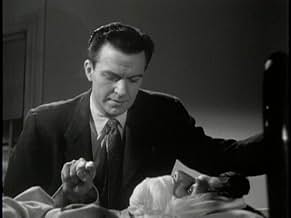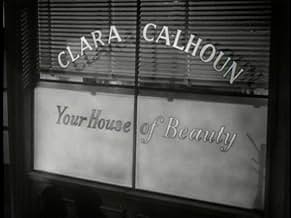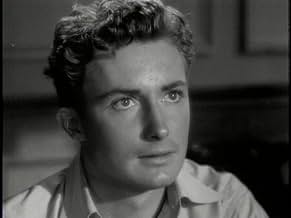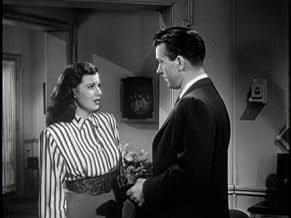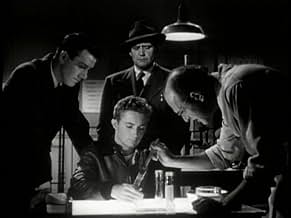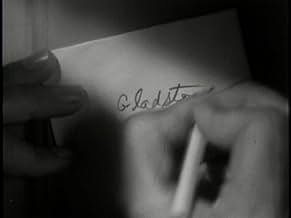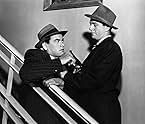NOTE IMDb
6,6/10
1,9 k
MA NOTE
Ajouter une intrigue dans votre langueA beautician and her crooked boyfriend attempt to rob the bookie operation located in the back room, but when the plan goes wrong, they frame an innocent man.A beautician and her crooked boyfriend attempt to rob the bookie operation located in the back room, but when the plan goes wrong, they frame an innocent man.A beautician and her crooked boyfriend attempt to rob the bookie operation located in the back room, but when the plan goes wrong, they frame an innocent man.
- Réalisation
- Scénario
- Casting principal
Gordon B. Clarke
- Club Pianist
- (non crédité)
Ellen Corby
- Mrs. Wills
- (non crédité)
Kenneth Farrell
- Burns
- (non crédité)
Herschel Graham
- Nightclub Patron
- (non crédité)
Mira McKinney
- Beauty Salon Owner
- (non crédité)
Philip Morris
- Guard
- (non crédité)
Paul Power
- Nightclub Patron
- (non crédité)
Avis à la une
Railroaded (1947)
An almost amazing movie, well made, beautifully photographed, held back by a stiff script but still it manages. And it has a dark current that makes it both creepy and contemporary. Director Anthony Mann seems to have made a dozen great films that are just under the radar, noirs and westerns that have some edge to them to keep them from falling into the abyss of their genres.
This is Mann at his mature earliest. He had made a few films in the earlier 40s, but this, along with "Desperate," marks his coming into his own. Yes, you might find too much of a formula at work here, but it's not derivative, just a little stilted in the dialog. And yes, you might ask, near the beginning, why the cops couldn't see how easy the frame up would be (anyone could have stolen the truck and committed the crime), but remember, this one fact was supported by several others, including an eyewitness confirmation. So, once over these humps, you are for a good ride.
Who to watch for amongst these relative unknowns? John Ireland, most of all, for his bad guy personification, all charm and heartlessness, simultaneously. His girlfriend, played by Sheila Ryan, is his match, in a sharp performance also dripping with selfish cruelty, but tempered, critically, by doubt and remorse.
The third star is the little known cinematographer Guy Roe, who must have been inspired by the young, rising director. The filming right from the opening, subtle crane shot of the beauty parlor facade is artfully gorgeous without becoming baroque the way Orson Welles had become (beautifully) by 1947 with "The Lady from Shanghai." Both are great examples of where the movies were just after the war, both with a dark, brooding, searching uncertainty. And both showing off the amazing movie-making machinery of post-War Hollywood. I say this because both films were smaller budget affairs, and yet they have uncompromised production.
Give this a serious look. It's imperfect, for sure, but it has such high points, including some dark dark filming that is so kinetic and scary it surprised even an old film noir fan like me, you'll be glad.
An almost amazing movie, well made, beautifully photographed, held back by a stiff script but still it manages. And it has a dark current that makes it both creepy and contemporary. Director Anthony Mann seems to have made a dozen great films that are just under the radar, noirs and westerns that have some edge to them to keep them from falling into the abyss of their genres.
This is Mann at his mature earliest. He had made a few films in the earlier 40s, but this, along with "Desperate," marks his coming into his own. Yes, you might find too much of a formula at work here, but it's not derivative, just a little stilted in the dialog. And yes, you might ask, near the beginning, why the cops couldn't see how easy the frame up would be (anyone could have stolen the truck and committed the crime), but remember, this one fact was supported by several others, including an eyewitness confirmation. So, once over these humps, you are for a good ride.
Who to watch for amongst these relative unknowns? John Ireland, most of all, for his bad guy personification, all charm and heartlessness, simultaneously. His girlfriend, played by Sheila Ryan, is his match, in a sharp performance also dripping with selfish cruelty, but tempered, critically, by doubt and remorse.
The third star is the little known cinematographer Guy Roe, who must have been inspired by the young, rising director. The filming right from the opening, subtle crane shot of the beauty parlor facade is artfully gorgeous without becoming baroque the way Orson Welles had become (beautifully) by 1947 with "The Lady from Shanghai." Both are great examples of where the movies were just after the war, both with a dark, brooding, searching uncertainty. And both showing off the amazing movie-making machinery of post-War Hollywood. I say this because both films were smaller budget affairs, and yet they have uncompromised production.
Give this a serious look. It's imperfect, for sure, but it has such high points, including some dark dark filming that is so kinetic and scary it surprised even an old film noir fan like me, you'll be glad.
This film has it all, great photography, well developed plot AND story, snappy dialogue and passable acting. I suppose I shouldn't say it has it "all" in that case, as the characters are not particularly round and because of that the acting is not always completely satisfying to me. But that doesn't prevent me from popping this movie in again and again, just because it's non-stop action and so so pretty to look at.
"Leave it Beaver" fans should see this, of course, but might be slightly disappointed that Beaumont is a bit more rigid than the sit-com serial allowed him to be - I wished for more warmth from his character, as I know he was capable of conveying. John Ireland, however, was brilliantly evil and his acting, at least, was top notch.
"Leave it Beaver" fans should see this, of course, but might be slightly disappointed that Beaumont is a bit more rigid than the sit-com serial allowed him to be - I wished for more warmth from his character, as I know he was capable of conveying. John Ireland, however, was brilliantly evil and his acting, at least, was top notch.
A faked robbery goes awry and a cop is killed, causing the perpetrators to frame an innocent kid to take the rap. What they don't foresee is the kid's stubborn sister.
John Ireland makes one nasty bad guy, and when he lovingly polishes that gunbarrel with perfumed bullets, we get the idea. Yes indeed, he's more than just a bad guy. The movie's a crime drama done in noirish style by the expert Anthony Mann. There's little of the hallmark ambiguity of classic noir in the characters. Nonetheless, there's the innocent kid Steve (Kelly) who looks to be the victim of a malevolent noirish fate. Of course, there has to be a cheap dame in the crime mix, and Jane Randolph flops around effectively as Duke's (Ireland) brassy blonde punching bag.
Note how the movie starts out in slam-bang fashion, and how effectively Mann uses close- ups, especially of the suddenly terrified Marie (Converse), to turn screen violence into a sense of real violence. This, I think, was a Mann specialty and one reason he's treasured by fans of noir. Then too, that shootout in the shadowy nightclub amounts to a clever touch of visual imagination. No, the story itself is not exactly novel, while Beaumont makes the kind of cop you'd expect from Beaver Cleaver's dad. Still, the movie's done with style and conviction, with an outstanding turn from Ireland, and rightfully belongs in the canon of 40's noir.
John Ireland makes one nasty bad guy, and when he lovingly polishes that gunbarrel with perfumed bullets, we get the idea. Yes indeed, he's more than just a bad guy. The movie's a crime drama done in noirish style by the expert Anthony Mann. There's little of the hallmark ambiguity of classic noir in the characters. Nonetheless, there's the innocent kid Steve (Kelly) who looks to be the victim of a malevolent noirish fate. Of course, there has to be a cheap dame in the crime mix, and Jane Randolph flops around effectively as Duke's (Ireland) brassy blonde punching bag.
Note how the movie starts out in slam-bang fashion, and how effectively Mann uses close- ups, especially of the suddenly terrified Marie (Converse), to turn screen violence into a sense of real violence. This, I think, was a Mann specialty and one reason he's treasured by fans of noir. Then too, that shootout in the shadowy nightclub amounts to a clever touch of visual imagination. No, the story itself is not exactly novel, while Beaumont makes the kind of cop you'd expect from Beaver Cleaver's dad. Still, the movie's done with style and conviction, with an outstanding turn from Ireland, and rightfully belongs in the canon of 40's noir.
Top billing for "Railroaded!" goes to the great actor John Ireland who plays the coldblooded killer Duke Martin. Today, Ireland is perhaps best remembered for his role as the gunslinger, Cherry Valance, in the John Wayne western classic "Red River" and for his Academy-Award- nominated performance as a reporter in another Hollywood classic "All the King's Men." Duke Martin, as with most of the heavies in noir flicks, is a misogynist. But this time the woman hater doesn't get away with it completely. Both Clara Calhoun (Jane Randolph) and Rosie Ryan (Sheila Ryan) put him in his place. When Duke misquotes Oscar Wilde, "Some women should be beaten regularly, like gongs" (it was actually Noel Coward who used the line), Clara is quick to respond to the effect that if that line belonged to Oscar Wilde, then let him have it. When Rosie and Duke first meet at Duke's club, Duke calls women "dames." Rosie responds sharply, "I don't like that term." Duke backs up and uses the still somewhat derogatory "gals."
The plot involves Rosie's brother, Steve, portrayed by unknown actor Ed Kelly, who only made three films to my knowledge. Duke and his girlfriend, Clara, frame Steve for a bookie heist, during which time a patrolman is killed. The police are after a quick conviction and are getting ready to go to trial and ask for the death penalty when Police Sgt. Mickey Ferguson (Hugh Beaumont, aka Ward Cleaver) falls for Rosie and decides that her brother may not be guilty after all. Ferguson attempts to help Rosie find the real murderer when Rosie decides to conduct her own investigation by becoming chums with Duke. This all leads to more murders until the ultimate confrontation between Ferguson and Duke. The film is fast-paced and somewhat violent for its day.
The creative use of darkness and shadow was an important ingredient of noir cinema, but as one IMDb reviewer has already noted, there is so much darkness in "Railroaded!" that at times it is difficult to see what is happening. One reason for this may be viewing the film on a TV screen. Perhaps on the big screen there was no problem. Outside of this minor weakness, "Railroaded!" is a winner all the way.
The plot involves Rosie's brother, Steve, portrayed by unknown actor Ed Kelly, who only made three films to my knowledge. Duke and his girlfriend, Clara, frame Steve for a bookie heist, during which time a patrolman is killed. The police are after a quick conviction and are getting ready to go to trial and ask for the death penalty when Police Sgt. Mickey Ferguson (Hugh Beaumont, aka Ward Cleaver) falls for Rosie and decides that her brother may not be guilty after all. Ferguson attempts to help Rosie find the real murderer when Rosie decides to conduct her own investigation by becoming chums with Duke. This all leads to more murders until the ultimate confrontation between Ferguson and Duke. The film is fast-paced and somewhat violent for its day.
The creative use of darkness and shadow was an important ingredient of noir cinema, but as one IMDb reviewer has already noted, there is so much darkness in "Railroaded!" that at times it is difficult to see what is happening. One reason for this may be viewing the film on a TV screen. Perhaps on the big screen there was no problem. Outside of this minor weakness, "Railroaded!" is a winner all the way.
Set Up! or Framed! might be better titles than Railroaded! While it's true that the police pursue their suspect (Ed Kelly) with undue alacrity, it's also true that they're only following a trail of maliciously planted evidence. And an odd feature of the movie is that Kelly remains almost an incidental character (not even appearing in the credits); the focus stays on the police and the real behind-the-scenes villain.
Brash blonde Jane Randolph operates a little beauty salon that's really a front for a back-room book. One night a couple of masked robbers knock it over, but things go wrong: A beat cop is killed, and one of the gunmen (Keefe Brasselle) takes a bullet. Soon detective Hugh Beaumont knocks on Kelly's door, led there by the boy's monogrammed navy scarf, a sighting of his van at the scene, and a description provided by Randolph. Even Brasselle, bandaged up like the Invisible Man, names Kelly in deathbed testimony.
The only one who believes his innocence is his sister (Sheila Ryan). Luckily, Beaumont knows her from the old neighborhood and still is a bit sweet on her. Unluckily, so is the man who set up her brother (John Ireland) as part of a coverup to swindle the head of the syndicate both he and Randolph work for. Little by little, the craftily stitched-together ruse starts to pull apart at the seams, and the hotheaded Ireland grows more reckless and violent...
Directed by Anthony Mann just before his collaboration with cinematographer John Alton took his work to a new plateau, Railroaded! displays some of his trademark tricks (a taut story line; swift and unexpected burst of violence; shadows used not merely as mood but visual metaphors).
And Ireland gets not only top billing but one of his best roles. When he's not slapping around Randolph for her sloppy drinking (in the grand tradition of alcoholic molls like Claire Trevor in Key Largo and Gloria Grahame in The Big Heat), he's fetishistically perfuming his bullets. He's quite the sex-equals-violence kind of guy; when Randolph and Ryan get into a hair-pulling tussle, he watches from an alcove with a nasty smirk on his face, and his gun barrel unconsciously traces the action. It's as if it's deciding who will be the lucky recipient of its payload.
Brash blonde Jane Randolph operates a little beauty salon that's really a front for a back-room book. One night a couple of masked robbers knock it over, but things go wrong: A beat cop is killed, and one of the gunmen (Keefe Brasselle) takes a bullet. Soon detective Hugh Beaumont knocks on Kelly's door, led there by the boy's monogrammed navy scarf, a sighting of his van at the scene, and a description provided by Randolph. Even Brasselle, bandaged up like the Invisible Man, names Kelly in deathbed testimony.
The only one who believes his innocence is his sister (Sheila Ryan). Luckily, Beaumont knows her from the old neighborhood and still is a bit sweet on her. Unluckily, so is the man who set up her brother (John Ireland) as part of a coverup to swindle the head of the syndicate both he and Randolph work for. Little by little, the craftily stitched-together ruse starts to pull apart at the seams, and the hotheaded Ireland grows more reckless and violent...
Directed by Anthony Mann just before his collaboration with cinematographer John Alton took his work to a new plateau, Railroaded! displays some of his trademark tricks (a taut story line; swift and unexpected burst of violence; shadows used not merely as mood but visual metaphors).
And Ireland gets not only top billing but one of his best roles. When he's not slapping around Randolph for her sloppy drinking (in the grand tradition of alcoholic molls like Claire Trevor in Key Largo and Gloria Grahame in The Big Heat), he's fetishistically perfuming his bullets. He's quite the sex-equals-violence kind of guy; when Randolph and Ryan get into a hair-pulling tussle, he watches from an alcove with a nasty smirk on his face, and his gun barrel unconsciously traces the action. It's as if it's deciding who will be the lucky recipient of its payload.
Le saviez-vous
- AnecdotesA policeman says, "The more I see of them [criminals], the more I love my dog." This was originally said by the French author Mme. de Sevigne, but she meant "them" to refer to all men.
- GaffesReading from a book, Jackland Ainsworth quotes, "Some women should be struck regularly - like gongs", adding, "That's from Oscar Wilde, you know." In fact, it's a quotation from Noel Coward's play, "Private Lives".
- ConnexionsReferences Fortunes rapides (1931)
Meilleurs choix
Connectez-vous pour évaluer et suivre la liste de favoris afin de recevoir des recommandations personnalisées
- How long is Railroaded!?Alimenté par Alexa
Détails
Box-office
- Budget
- 500 000 $US (estimé)
- Durée1 heure 12 minutes
- Couleur
- Rapport de forme
- 1.37 : 1
Contribuer à cette page
Suggérer une modification ou ajouter du contenu manquant


